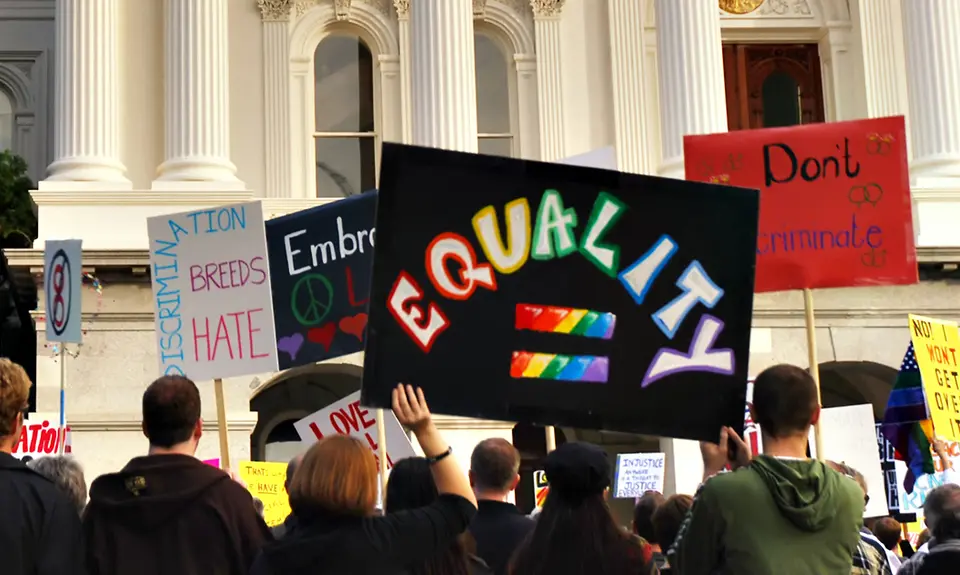The Equality Act recognizes that every American deserves full and equal rights under the law. In advancing explicit protections against sexual orientation and gender identity discrimination, the bill addresses a critical factor that drives LGBTQ+ people into poverty and the criminal legal system. According to a letter signed by People For the American Way and allied organizations, thanks in part to the discrimination they face, LGBTQ+ people are more likely to be jobless, homeless, and poor than the general population, and thus may be driven into underground survival economies to obtain basic life necessities. You can download our letter here.
Dear Chairman Nadler, Ranking Member Collins, and Committee Members:
The undersigned lesbian, gay, bisexual, transgender, and queer (LGBTQ) and allied organizations write to express our strong support for the Equality Act (H.R. 5). As LGBTQ and allied organizations, we are particularly eager to discuss how anti-LGBTQ discrimination drives LGBTQ people into poverty and the criminal legal system, as well as discuss the Equality Act’s ability to help address these issues.
Employment discrimination is a significant factor contributing to LGBTQ poverty and unemployment rates. Over half of the U.S. population lives in a state without comprehensive, explicit nondiscrimination laws prohibiting employment discrimination based on sexual orientation and gender identity.1 A 2017 Harvard School of Public Health survey found that one in five LGBTQ people reported experiencing discrimination in hiring, pay, and promotions due to their sexual orientation or gender identity.2
Because of discrimination in employment, housing, education, and other areas,3 LGBTQ individuals are more likely to be jobless, homeless, and poor than the general population. Additionally, same-sex couples are more likely to experience poverty than different-sex couples4 , and the U.S. Transgender Survey found that nearly one-third (29%) of transgender respondents were living in poverty compared to 12% of the general U.S. population.5 This disproportionate rate of poverty is particularly acute for women, people of color, and bisexual people.6
Widespread discrimination combined with higher rates of poverty lead many LGBTQ people to turn to underground survival economies, like the sex and drug trade, to obtain basic necessities including food and housing.7 For example, family rejection and abuse led George, a gay man, to flee his home at the age of 14. Facing anti-LGBTQ discrimination and social stigmatization, George “lived on the streets and worked as a prostitute to survive” until he was arrested and placed in an LGBTQ group home.8
LGBTQ youth face similar pressure to seek survival economies for basic survival. The impact of schools’ severe disciplinary policies combined with bullying and harassment of LGBTQ students by their peers and school staff push more LGBTQ students out of schools and into the criminal legal system.9 As a transgender teenager of color, Kourtnee Davinnie suffered bullying and being chased out of her school by her classmates, as well as discrimination by school staff.10 The extra stress and unsafety she experienced in school caused her to battle “with being in and out of school, in and out of the streets, on drugs, and doing sex work…to survive on a daily basis.”11
To address anti-LGBTQ discrimination, the Equality Act explicitly prohibits discrimination based on an individual’s sexual orientation or gender identity in employment, housing, credit, education, public spaces and services, jury service, and programs receiving federal financial assistance. By combatting discrimination in these areas, the Equality Act will help address the issues that push many LGBTQ people into poverty and the criminal legal system. By protecting LGBTQ employees from discrimination in hiring, pay, and other working conditions, the Equality Act will help to reduce joblessness and poverty.
The Equality Act will also decrease other factors, such as housing and education discrimination, that drive many LGBTQ people into survival economies to escape poverty, homelessness, and hunger. Ultimately, the Equality Act will help place LGBTQ people on more equal footing, reduce stigma and bias, and give more LGBTQ people a fair chance to obtain an education, find housing, and support themselves and their families.
We ask that Congress recognize the critical need for these consistent, explicit, and nationwide protections.
